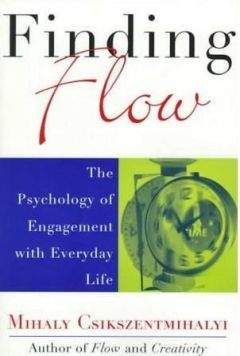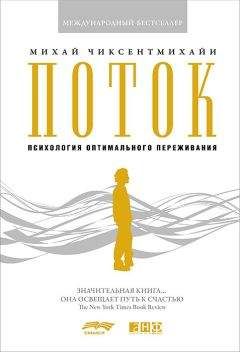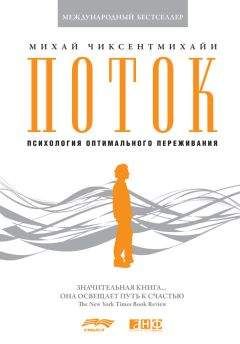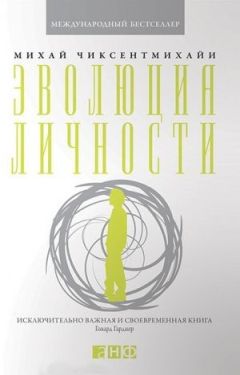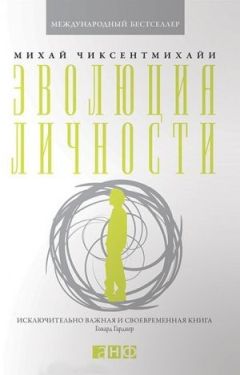Михай Чиксентмихайи - В поисках потока. Психология включенности в повседневность
Csikszentmihalyi, M., and J. LeFevre. 1989. Optimal experience I work and leisure. Journal of Personality and Social Psychology 56, no. 5:815–22.
Csikszentmihalyi, M., and K. Rathunde. 1993. The measurement of flow in everyday life. In Nebraska Symposium on Motivation 40:58–97. Lincoln, Neb.: University of Nebraska Press.
-----. In press. The development of the person: An experiential perspective on the ontogenesis of psychological complexity. In Theoretical Models of Human Development, edited by R. M. Lerner, Vol. 1, Handbook of Child Development New York: Wiley.
CsiLszentmihalyi, M., and E. Rochberg-Halton. 1981. The meaning of things: Domestic symbols and the self New York: Cambridge University Press.
Csikszentmihalyi, M., K. Rathunde, and S. Whalen. 1993. Talented, teenagers: The roots of success and failure New York: Cambridge University Press.
Davis, N. Z., and A. Farge, eds. 1993. A history of women in the West Cambridge, Mass.: Harvard University Press.
Delle Fave, A, and F. Massimini. 1988. The changing contexts of flow in work and leisure. In Optimal experience: Psychological studies of flaw in consciousness, edited by M. Csikszentmihalyi and I.S. Csikszentmihalyi. New York: Cambridge University Press, pp. 193–214.
deVries, M., ed. 1992. The experience of psychopathology. Cambridge, UK: Cambridge University Press.
Diener, E., and С. Diener. 1996. Most people are happy. Psychological Science 7, no. 3:181–4.
Edwards, J. N., ed. 1969. The family and change. New York: Alfred A. Knopf.
Ferenczi, S. 1950. Sunday neuroses. In Further contributions to tbi theory and techniques of psychoanalysis, edited by S. Ferenczi, 174–7. London: Hogarth Press.
Fiore, G. 1973. Antonio Gramsci: Life of a revolutionary. New York Schocken Books.
Fortune, R. F. [1932] 1963. Sorcerers of Dobu. New York: Dutton.
Gallagher, W. 1993. The power of place: How our surroundings shapt our thoughts, emotions, and actions. New York: Poseidon Press.
Gardner, H. 1983. Frames of mind: The theory of multiple intelligences. New York: Basic Books.
Graef, R., S. McManama Gianinno, and M. Csikszentmihalyi. 1981. Energy consumption in leisure and perceived happiness. In Consumers and energy conservation, edited by J. D. Claxton et al. New York: Praeger.
Gussen, J. 1967. The psychodynamics of leisure. In Leisure and mental health: A psychiatric viewpoint, edited by P. A. Martin. Washington, D.C.: American Psychiatric Association.
Hart, L. M. 1992. Ritual art and the production of Hindu selves. American Anthropological Association Meetings. San Francisco, Calif.
Haworth, J. Т., and J. Ducker. 1991. Psychological well-being and access to categories of experience in unemployed young adults. Leisure Studies 10:265–74.
Hecht, A. 1993. The hidden law: The poetry of W. H. Auden. Cambridge, Mass.: Harvard University Press.
Hedricks, С. In press. The ecology of pain in Latina and Caucasian women with metastatic breast cancer: A pilot study. In nth Biannual meeting of the Society for Menstrual Cycle Research, edited by J. Chrisler.
Heine, С. 1996. Flow and achievement in mathematics. Ph.D. diss., University of Chicago.
Hektner, J. M. 1996. Exploring optimal personality development: A longitudinal study of adolescents. Ph.D. diss., University of Chicago.
Herlihy, D. 1985. Medieval households. Cambridge, Mass.: Harvard University Press.
Huang, M. P.-L. 1996. Family context and social development in adolescence. Ph.D. diss., University of Chicago.
Hufton, O. 1993. Women, work, and family In A history of women in the West, edited by N. Zemon Davis and A. Farge. Cambridge, Mass.: Harvard University Press, pp. 15–45.
Huxley, J. 1947. Evolution and ethics. London: Pilot Press.
Huxley, T. H. 1894. Evolution and ethics and other essays. New York: Appleton.
Inghilleri, P. 1993. Selezione psicologica bi-culturale: Verso l’aumento della complessità individuale e sociale. II caso dei Navajo. In La selezione psicologica umana, edited by F. Massimini and P. Inghilleri. Milan: Cooperative Libraria Iulm. Inghilleri, P. 1995. Esperienza soggettiva, personality, evoluzione culturale. Turin, Italy: UTET.
Inglehart, R. 1990. Culture shift in advanced industrial society. Princeton: Princeton University Press.
Jackson, S. A. In press. Toward a conceptual understanding of the flow experience in elite athletes. Research quarterly for exercise and sport.
James, W. 1890. Principles of psychology. New York: Henry Holt.
Johnston, C. M. 1984. The creative imperative: Human growth and planetary evolution.
Berkeley, Calif.: Celestial Arts.
Jung, C. G. 1954. The development of personality. New York: Pantheon.
Kakar, S. 1978. The inner world: A psychoanalytic study of childhood of and society in India New Delhi: Oxford University Press.
Kelly, J. R. 1982. Leisure. Englewood Cliffs, N.J.: Prentice-Hall.
Klein, G., ed. 1990. Om kreativitet och flow. Stockholm, Sweden: Brombergs.
Kubey, R., and M. Csikszentmihalyi. 1990. Television and the quality of life. Hillsdale, N.J.: Lawrence Erlbaum.
Larson, R., and M. Csikszentmihalyi. 1978. Experiential correlates of solitude in adolescence. Journal of Personality 46, no. 4:677–93.
Larson, R., and M. H. Richards. 1994. Divergent realities: The emotional lives of mothers, fathers, and adolescents. New York: Basic Books.
Larson, R., R. Mannell, and J. Zuzanek. 1986. Daily well-being of older adults with family and friends. Psychology and Aging 12:117–26.
Lash, C. 1990. The true and only heaven: Progress and its critics. New York: Norton.
Le Roy Ladurie, E. 1979. Montaillou. New York: Vintage.
Lebra, T. S. 1976. Japanese patterns of behavior. Honolulu: University of Hawaii Press. Lee, R. B., and I. DeVore, eds. 1968. Man the hunter. Chicago: Aldine.
Lerner, R. M. 1984. On the nature of human plasticity. New York: Cambridge University Press.
Lewinsohn, P. M. 1982. Behavioral therapy: Clinical applications. In Short-term therapies for depression, edited by A. J. Rush. New York: Guilford.
Loubris, S., F. Crous, and J. M. Schepers. 1995. Management by objectives in relation to optimal experience in the workplace. Journal of Industrial Psychology 21, no. 2:12–17.
Lykken, D., and A. Tellegen. 1996. Happiness is a stochastic phenomenon. Psychological Science 7, no. 3:186–9.
Macbeth, J. 1988. Ocean cruising. In Optimal experience: Psychological studies of flow in consciousness, edited by M. Csikszentmihalyi and I. S. Csikszentmihalyi. New York: Cambridge University Press, pp. 214–31.
Marcuse, H. 1955. Eros and civilisation. Boston: Beacon.
Markus, H. R., and S. Kitayama. 1991. Culture and self: Implications for cognition, emotion, and motivation. Psychological Review 98, no. 2:224–53.
Marriott, M. 1976. Hindu transactions: Diversity without dualism. In Transaction and meaning: Directions in the anthropology of exchange and symbolic behavior, edited by B. Kepferer. Philadelphia: ISHI Publications.
Maslow, A. 1971. The farther reaches of human nature. New York: Viking.
Massimini, F., and M. Carli. 1988. The systematic assessment of flow in daily experience. In Optimal experience: Psychological studies of flow in consciousness, edited by M. Csikszentmihalyi and I. S. Csikszentmihalyi. New York: Cambridge University Press, pp. 266–87.
Massimini, F., and A. Delle Fave. 1991. Religion and cultural evolution. Zygon 16, no. 1:27–48.
Massimini, F., and P. Inghilleri, eds. 1986. L’esperienza quotidiana: Teoria e metodi d’analisi. Milan: Franco Angeli.
McQuillan, J., and G. Conde. 1996. The conditions of flow in reading: Two studies of optimal experience. Reading Psychology 17:109–35.
Mitterauer, M., and R. Sieder. 1982. The European family. Chicago: University of Chicago Press.
Moneta, G. B., and M. Csikszentmihalyi. 1996. The effect of perceived challenges and skills on the quality of subjective experience. Journal of Personality 64, no. 2:275–310.
Myers, D. G. 1992. The Pursuit of Happiness. New York: Morrow.
Myers, D. G, and E. Diener. 1995. Who is happy? Psychological Science 6:10–19.
Negri, P., F. Massimini, and A. Delle Fave. 1992. Tema di vita e strategie adattive nei non vedenti. In Vedere con la mente, edited by D. Galati. Milan, Italy: Franco Angeli.
Nietzsche, F. [1882] 1974. The gay science. New York: Vintage.
Noelle-Neumann, E. 1995. AWA Spring Survey. Allensbach Institute fur Demoskopie.
-----. 1996. Stationen der Glücksforschung. In Leseglück: Eine vergessene Erfahrung?, edited by A. Bellebaum and L. Muth. Opladen: Westdeutscher Verlag, pp. 15–56.
Noelle-Neumann, E., and R. Kocher, eds. 1993. Allensbacher Jahrbuch der Demoskopie 1984–1992. Munich, Germany: K.G. Saur.
Noelle-Neumann, E., and B. Strumpel. 1984. Macht Arbeit Krank? Macht Arbeit glüchlkh? Munich: Pieper Verlag.
Norberg, K. 1993. Prostitutes. In A history of women in the West, edited by N. Zemon Davis and A. Farge. Cambridge, Mass.: Harvard University Press, pp. 458–74.
Perry, S. K. 1996. When time stops: How creative writers experience entry into the flow state. Ph.D. diss., The Fielding Institute.
Pirsig, R. 1977. Cruising blues and their cure. Esquire 87, no. 5:65–8. Psychiatry, Group for the Advancement of. 1958. The psychiatrists’ interest in lesure-time activities, no. 39.
Rathunde, K. In press. Family context and talented adolescents’ optimal experience in productive activities. Journal of research in adolescence.
Reigberg, D. 1995. Glück in Garten — Erfolg im Markt. Offenburg, Germany: Senator Verlag.
Riesman, D., N. Glazer, and R. Denney. 1950. The lonely crowd. New York: Doubleday.
Rogers, C. 1969. Freedom to learn. Columbus, Ohio: Charles Merrill.
Sahlins, M. D. 1972. Stone Age economics. Chicago: Aldine Press.
Schmidt, J. 1997. Workers and players: Exploring involvement levels and experience of adolescents in work and play. Meetings of the American Educational Research Association. Boston, Mass.
Selye, H. 1956. The stress of life. New York: McGraw-Hill.
Singer, I. 1966. The nature of love. 3 vols. Chicago: University of Chicago Press.
Singer, J. L. 1966. Daydreaming: An introduction to the experimental study of inner experience. New York: Random House.
-----. 1981. Daydreaming and fantasy. Oxford, UK: Oxford University Press.
Stein, G. L., J. C. Kimiecik, J. Daniels, and S. A. Jackson, 1995. Psychological antecedents of flow in recreational sports. Personality and social psychology bulletin 21, no. 2:125–35.
Szalai, A., ed. 1965. The use of time: Daily activities of urban and suburban populations in twelve countries. Paris: Mouton.
Teilhard de Chardin, P. 1965. The phenomenon of man. New York: Harper and Row. Terkel, S. 1974. Working. New York: Pantheon.
Thompson, E. P. 1963. The making of the English working class. New York: Viking.
Trevino L.K., and J. W. Trevino. 1992. Flow in computer-mediated communication. Communication Research 19, no. 5:539–73.
Veyne, P. 1987. The Roman Empire. In From Pagan Rome to Byzantium, edited by P. Veyne. Cambridge, Mass: The Belknap Press, pp. 5–230.
Webster, J., and J. J. Martocchio. 1993. Turning work into play: Implications for microcomputer software training. Journal of Managements, no. 1:127–46.
Wells, A. 1988. Self-esteem and optimal experience. In Optimal Experience: Psychological studies of flow in consciousness, edited by M. Csikszentmihalyi and I. S. Csikszentmihalyi. New York: Cambridge University Press, pp. 327–41.
Williams, G. C. 1988. Huxley’s «Evolution and ethics» in sociobiological perspective. Zygon 23, no. 4:383–407.
Yankelovich, D. 1981. New rules in American life: Searching for self-fulfillment in a world turned upside-down. Psychology Today 15, no. 4:35–91.
Сноски
1
Утверждение Паскаля о том, что, хотя существование бога недоказуемо, все равно следует вести себя так, будто он есть: если его нет — ты ничего не потеряешь, а если есть — обретешь спасение. — Прим. пер.
